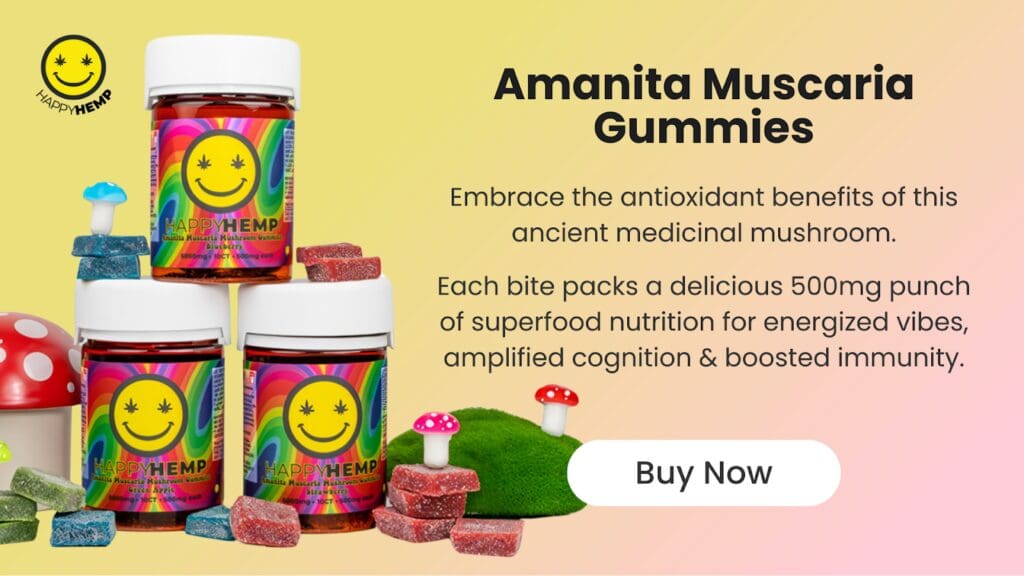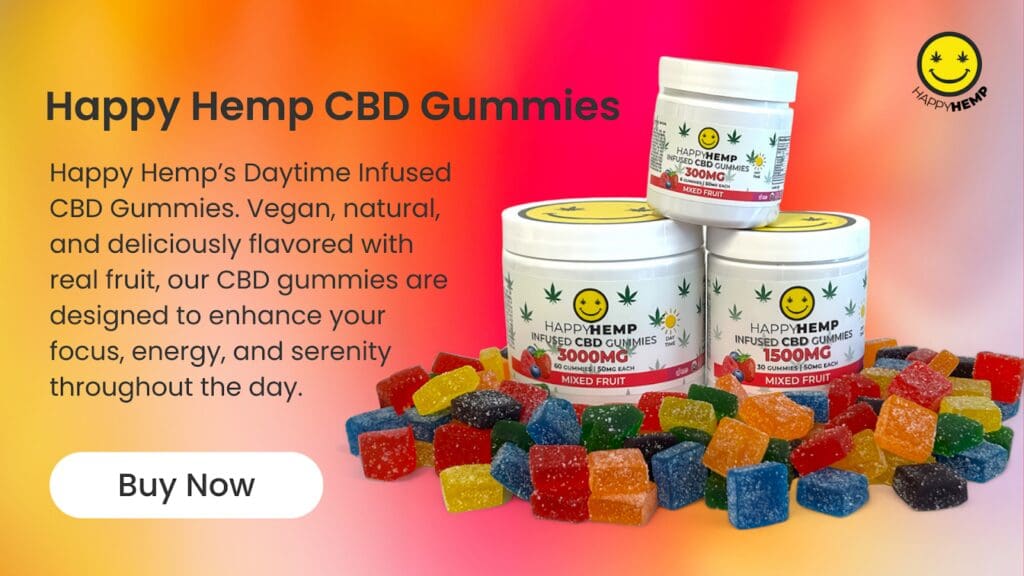Key Takeaways:
- Natural Anti-Inflammatory Power: Learn how mushrooms combat inflammation with bioactive compounds.
- Science-Backed Benefits: Explore research supporting mushroom benefits for inflammation relief.
- Practical Usage Tips: Find out how to incorporate anti-inflammatory mushrooms into your daily diet easily.
Ever wondered if a sweet, natural remedy could help ease inflammation? Mushrooms have long been cherished in traditional medicine for their healing properties, especially when it comes to reducing inflammation. At Happy Hemp, we pride ourselves on transforming powerful ingredients into easy-to-enjoy mushroom gummies that pack the full benefits of these functional superfoods into every bite. Crafted to support your health journey naturally, our mushroom gummies make daily wellness easy and delicious.
In this guide, we’ll explore how these mushrooms work wonders for inflammation relief.
How Mushrooms Work As Natural Anti-Inflammatories
Mushrooms are gaining attention for their potent anti-inflammatory properties, which are rooted in a range of bioactive compounds that directly impact inflammation at its core. These unique fungi contribute to reducing inflammation, supporting the immune system, and enhancing the body’s ability to cope with various stressors. Let’s explore how mushrooms work as natural anti-inflammatories and support overall health.
Bioactive Compounds: Polysaccharides, Terpenoids, And Phenolic Compounds
Mushrooms contain a wealth of bioactive compounds like polysaccharides, terpenoids, and phenolic compounds, each playing a distinct role in fighting inflammation. Polysaccharides stimulate immune cells, terpenoids help neutralize free radicals, and phenolic compounds reduce inflammation by acting as antioxidants. Together, they form a powerful trifecta for managing and reducing inflammatory responses in the body.
Regulation Of Cytokines To Manage Inflammatory Responses
Cytokines are proteins that signal inflammation, and when overly active, they can lead to chronic inflammation. Mushrooms help modulate cytokine production, balancing these signaling proteins to avoid prolonged inflammation. By reducing excess cytokine levels, mushrooms contribute to a healthier immune response without suppressing necessary inflammatory reactions.
Adaptogenic Properties For Stress-Related Inflammation Relief
Mushrooms act as adaptogens, helping the body manage and respond to various stressors—physical, emotional, and environmental. This adaptogenic quality reduces stress-induced inflammation, which is often a factor in chronic conditions. By strengthening resilience to stress, mushrooms indirectly support lower inflammation levels and overall wellness.
Reduction Of Oxidative Stress For Enhanced Cellular Health
Oxidative stress from free radicals can exacerbate inflammation and lead to cellular damage over time. Mushrooms contain antioxidants that reduce oxidative stress, which not only lessens inflammation but also supports cellular health. This antioxidant action protects tissues from damage and helps maintain a balanced inflammatory response.
Immune System Modulation For Balanced Inflammatory Responses
Mushrooms interact with the immune system by enhancing its ability to recognize and respond appropriately to potential threats. This modulation supports immune resilience, allowing the body to manage inflammation without overreacting. By promoting an efficient immune response, mushrooms help the body balance inflammation, contributing to long-term health benefits.
Support your wellness naturally with Happy Hemp’s potent mushroom gummies! Boost immunity, reduce inflammation, and elevate your daily routine with our delicious, high-quality mushroom blends. Discover the difference today!
Key Mushrooms Known For Fighting Inflammation
Several mushroom varieties are especially recognized for their anti-inflammatory benefits. Here are some of the most effective types:
- Reishi: Often called the “mushroom of immortality,” reishi is known for its strong anti-inflammatory and immune-boosting properties. It contains triterpenoids, which are compounds that have been shown to reduce inflammation and alleviate symptoms of various inflammatory diseases.
- Lion’s Mane: This unique mushroom supports brain health and helps reduce inflammation throughout the body. It has shown potential in reducing inflammation linked to neurodegenerative conditions, making it beneficial for cognitive wellness as well.
- Chaga: Known as a powerful antioxidant, chaga helps combat oxidative stress and inflammation. It contains betulinic acid, a compound that reduces inflammation and supports immune function.
- Turkey Tail: Turkey tail is rich in polysaccharides, particularly PSP (polysaccharide peptide), which is known to modulate the immune response and reduce chronic inflammation.
- Cordyceps: This mushroom is known to improve oxygen utilization and reduce fatigue, supporting the body’s ability to combat inflammation. Its active compounds also help lower inflammation associated with fatigue and exercise recovery.
These mushrooms offer a diverse range of benefits, all centered on helping the body manage and reduce inflammation naturally.
Nutritional Compounds In Mushrooms That Reduce Inflammation
Mushrooms offer a unique array of bioactive compounds that make them potent allies in managing inflammation naturally. These compounds, from immune-boosting polysaccharides to powerful antioxidants, work collectively to reduce inflammation and support the body’s overall health. Let’s explore the primary nutritional components in mushrooms that contribute to their impressive anti-inflammatory effects.
Beta-Glucans: Enhancing Immune Response To Target Inflammation
Beta-glucans are complex polysaccharides that stimulate the immune system, enhancing its ability to recognize and address inflammation sources. Found in abundance in reishi, shiitake, and maitake mushrooms, beta-glucans boost immune cell activity, allowing the body to effectively target inflammatory processes. This immune support is essential for reducing chronic inflammation and promoting a balanced immune response.
Antioxidants: Ergothioneine And Glutathione Combat Oxidative Stress
Mushrooms are packed with antioxidants, notably ergothioneine and glutathione, which play a central role in reducing oxidative stress. This oxidative stress, a key contributor to chronic inflammation, is mitigated by these antioxidants as they neutralize harmful free radicals that can damage cells. By reducing oxidative damage, mushrooms help prevent the onset of inflammation-related diseases and support long-term cellular health.
Polysaccharides: Regulating Inflammatory Processes For Immune Balance
Beyond their immune-boosting abilities, polysaccharides in mushrooms help regulate the body’s inflammatory processes, ensuring a balanced response to potential threats. These compounds prevent excessive inflammation, an important factor in managing chronic inflammatory conditions. Polysaccharides enable the immune system to respond effectively without overreacting, maintaining health and stability in inflammatory responses.
Triterpenoids: Potent Anti-Inflammatory Compounds In Reishi
Triterpenoids, particularly prevalent in reishi mushrooms, are known for their ability to reduce inflammation by inhibiting inflammatory markers. These compounds help manage symptoms of inflammatory diseases, such as arthritis, by curbing the activity of enzymes that promote inflammation. Triterpenoids are a key component in the natural anti-inflammatory arsenal of mushrooms, offering targeted support for inflammatory health concerns.
Phenolic Compounds And Flavonoids: Cellular And Brain Health Support
Mushrooms contain phenolic compounds and flavonoids, both of which offer powerful anti-inflammatory and antioxidant effects. These compounds help reduce inflammation throughout the body, including in the brain, by protecting cells from oxidative damage and supporting cellular health. The presence of phenolic compounds and flavonoids in mushrooms contributes to their overall effectiveness in managing inflammation and promoting wellness.
Incorporating Anti-Inflammatory Mushrooms Into Your Diet
Incorporating anti-inflammatory mushrooms into your diet can be a delicious and beneficial way to support your health. With their earthy flavors and potent health effects, mushrooms can be added to meals, beverages, and supplements, offering flexibility in how you enjoy them. Here are some practical ways to incorporate anti-inflammatory mushrooms and maximize their wellness benefits.
Fresh Mushrooms In Everyday Meals For Flavor And Health
Fresh mushrooms like shiitake, maitake, and portobello are widely available and can easily enhance the flavor and nutrition of your meals. Cooking these mushrooms in soups, stir-fries, or salads helps release their beneficial compounds, making them more bioavailable. Adding fresh mushrooms regularly to your diet is a simple and effective way to benefit from their natural anti-inflammatory properties.
Mushroom Powders For Convenient Nutrient Boosts In Drinks And Foods
Mushroom powders, derived from varieties like reishi, chaga, and lion’s mane, offer a convenient way to integrate anti-inflammatory mushrooms into your diet. These powdered extracts can be mixed into smoothies, teas, or coffees, making them easy to enjoy on the go. Mushroom coffee, in particular, is a popular option for those looking to reduce caffeine while still receiving a gentle, natural energy boost from these functional fungi.
Supplement Capsules For Consistent, Measured Doses
Mushroom supplements in capsule form provide a concentrated source of beneficial compounds and are ideal for those who prefer simplicity. Capsules allow for consistent, measured doses, which can be particularly useful for individuals with specific health goals. With a quick intake of these supplements, you can easily incorporate mushrooms’ anti-inflammatory benefits into your daily routine.
Broths And Tinctures For Flavorful And Functional Additions
Mushroom broths and tinctures are gaining popularity as they combine culinary enjoyment with health benefits. Mushroom broths serve as a flavorful base for soups or can be sipped on their own, delivering warmth along with anti-inflammatory benefits. Tinctures, on the other hand, are highly concentrated extracts that can be added to beverages, providing an easy, efficient way to enjoy mushrooms’ properties without cooking.
Precautions And Considerations When Using Mushrooms For Inflammation
While mushrooms are generally safe for most people, there are a few considerations to keep in mind:
- Allergies and Sensitivities: Some individuals may have sensitivities or allergies to certain types of mushrooms. If you’re new to a particular mushroom, start with a small amount to ensure it doesn’t cause any adverse reactions.
- Medication Interactions: Mushrooms like reishi and chaga may interact with certain medications, especially blood thinners, as they can have mild blood-thinning properties. Always consult with a healthcare provider if you’re taking prescription medications before incorporating medicinal mushrooms into your routine.
- Quality and Sourcing: To ensure safety and efficacy, choose high-quality mushrooms from reputable sources. Organic and third-party tested products are best, as mushrooms absorb elements from their environment, including potential toxins if grown in polluted areas.
- Pregnancy and Breastfeeding: Limited research is available on the use of medicinal mushrooms during pregnancy and breastfeeding. It’s recommended that individuals in these groups consult with a healthcare provider before consuming medicinal mushrooms.
- Moderation and Monitoring: While mushrooms are natural, it’s still essential to use them in moderation. Some mushrooms may have a cumulative effect, so monitor how your body responds and adjust intake if needed.
By keeping these precautions in mind, you can enjoy the anti-inflammatory benefits of mushrooms safely and effectively.
Final Thoughts
Incorporating anti-inflammatory mushrooms into your wellness routine can be a powerful, natural way to support the body’s fight against chronic inflammation. From reishi and lion’s mane to chaga and turkey tail, each mushroom offers unique compounds that work to modulate immune responses, reduce oxidative stress, and address inflammation at its source. These natural benefits make mushrooms an appealing alternative or complement to conventional anti-inflammatory approaches.
Whether used fresh in meals, taken as a supplement, or enjoyed as a warming broth, mushrooms are versatile and accessible, providing a sustainable option for those seeking relief from inflammation. As science continues to explore their benefits, the role of mushrooms in wellness is becoming increasingly clear, offering a pathway to health that harmonizes with nature.
By choosing to incorporate these potent fungi into your life, you take a step toward a holistic, balanced approach to wellness—one that aligns with the body’s natural healing processes.
Read also:
- Using CBD for Acne Management
- CBD and Diabetes: Exploring the Potential for Blood Sugar Regulation
- Managing OCD with CBD: A New Hope for Symptom Relief
Frequently Asked Questions About Mushrooms For Inflammation
What makes mushrooms effective for inflammation relief?
Mushrooms contain unique bioactive compounds, such as beta-glucans and antioxidants, which support immune function and naturally lower inflammation.
How quickly do mushrooms work to reduce inflammation?
Results vary by individual, but most people may notice gradual relief over weeks. Consistent use is key for experiencing full benefits.
Are mushroom supplements as effective as fresh mushrooms for inflammation?
Yes, quality supplements provide concentrated active compounds, making them an effective and convenient choice for inflammation support.
Which mushrooms are best for joint inflammation?
Reishi, chaga, and cordyceps mushrooms are commonly recommended for their joint-friendly anti-inflammatory effects and immune support.
Can mushrooms for inflammation help with autoimmune conditions?
Some studies suggest mushrooms may support immune balance, which can benefit autoimmune management, but they’re not a substitute for medical treatments.
Are mushroom gummies effective for inflammation, or are capsules better?
Both forms can be effective; the choice depends on personal preference. Gummies provide a tasty alternative for those who dislike capsules.
Is it safe to take mushroom supplements daily?
Generally, yes. However, it’s wise to follow recommended dosages and consult with a healthcare provider if you’re on medication or have medical concerns.
Can I take mushrooms for inflammation while pregnant?
While many mushrooms are safe, it’s best to consult a healthcare provider during pregnancy to ensure there’s no risk to you or your baby.
Are there any side effects to using mushrooms for inflammation?
Side effects are rare but may include digestive upset or allergic reactions. Starting with small doses helps you monitor any potential sensitivities.
Do anti-inflammatory mushrooms interact with medications?
Some mushrooms, like reishi, may interact with blood-thinning medications. If you’re taking prescriptions, consult your healthcare provider first.
Sources:
- Amirullah, N. A., Abdullah, E., Zainal Abidin, N., Abdullah, N., & Manickam, S. (2024). Therapeutic potential of mushrooms: A review on NF-κB modulation in chronic inflammation. Food Bioscience, 62, 105059. https://doi.org/10.1016/j.fbio.2024.105059
- Muszyńska, B., Grzywacz-Kisielewska, A., Kała, K., & Gdula-Argasińska, J. (2018). Anti-inflammatory properties of edible mushrooms: A review. Food Chemistry, 243, 373–381. https://doi.org/10.1016/j.foodchem.2017.09.149
- Garcia-Lafuentea, A., Moro, C., Villares, A., Guillamon, E., A. Rostagno, M., D’Arrigo, M., & Alfredo Martinez, J. (2010). Mushrooms as a Source of Anti-Inflammatory Agents. Anti-Inflammatory & Anti-Allergy Agents in Medicinal Chemistry, 9(2), 125–141. https://doi.org/10.2174/187152310791110643









